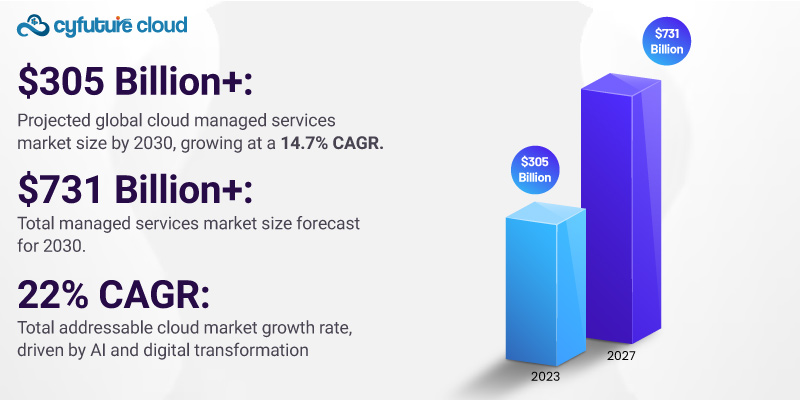Table of Contents
- The Cloud Landscape in 2025: Why Managed Services Matter
- What Are Managed Cloud Services?
- The Pros of Managed Cloud Services
- The Cons of Managed Cloud Services
- Managed Cloud Services in Action: Use Cases
- Key Statistics: The State of Managed Cloud Services in 2025
- Managed Cloud Services with Cyfuture Cloud
- Conclusion: Is Managed Cloud Right for You?
Cloud computing has transformed the way businesses operate, innovate, and scale. As organizations increasingly shift workloads to the cloud, the demand for managed cloud services has soared. Managed cloud services—where a third-party provider like Cyfuture Cloud oversees cloud infrastructure, security, maintenance, and support—offer a compelling way to harness the cloud’s full potential without the complexity of in-house management.
But are managed cloud services always the right choice?
Let’s explore the pros and cons, supported by the latest facts and figures.
The Cloud Landscape in 2025: Why Managed Services Matter
The global cloud services market is booming. In Q1 2025, enterprise spending on cloud infrastructure reached $94 billion, marking a 23% increase from the previous year. By the end of 2025, worldwide public cloud spending is projected to hit $723.4 billion, with cloud infrastructure accounting for 75% of total compute and storage spend by 2028.
Businesses of all sizes are embracing the cloud for its scalability, flexibility, and innovation potential. In fact, 96% of companies are expected to use public cloud services in 2025, and 84% will use private cloud services. With this rapid adoption comes greater complexity—fueling the rise of managed cloud services.
The managed cloud services market itself is on a steep growth trajectory, forecasted to reach $155.73 billion in 2025 and a staggering $482.93 billion by 2034, expanding at a CAGR of 13.4%. North America currently leads the market, but demand is surging worldwide as businesses seek to optimize costs, improve security, and focus on core competencies.
What Are Managed Cloud Services?
Managed cloud services involve outsourcing the day-to-day management of cloud infrastructure and applications to a specialized provider. This can include:
- Cloud infrastructure setup and optimization
- Security monitoring and threat mitigation
- Backup and disaster recovery
- Performance monitoring and scaling
- 24/7 technical support
- Compliance management
Providers like Cyfuture Cloud offer tailored solutions for public, private, and hybrid cloud environments, enabling organizations to leverage cloud technology without the burden of managing it themselves.

Global Market Growth
- $305 Billion+: Projected global cloud managed services market size by 2030, growing at a 14.7% CAGR.
- $731 Billion: Total managed services market size forecast for 2030.
- 22% CAGR: Total addressable cloud market growth rate, driven by AI and digital transformation
The Pros of Managed Cloud Services
Expertise and 24/7 Support
Managing cloud environments demands specialized skills and constant vigilance. With managed cloud services, businesses gain access to certified experts who monitor systems around the clock, proactively resolve issues, and implement best practices. This expertise is especially valuable as cloud architectures become more complex—think multi cloud, hybrid setups, and AI-driven workloads.
Cost Optimization
Cloud cost management is a top concern for organizations—nearly 60% now have dedicated FinOps teams focused on cloud cost optimization. Managed services providers use advanced tools to monitor usage, eliminate waste, and recommend the most cost-effective configurations. This helps businesses avoid the “cloud bill shock” that can result from unchecked resource consumption.
- Fact: 33% of organizations are spending over $12 million annually on public cloud services in 2025, up from 29% in 2024.
Enhanced Security and Compliance
Cyber threats are evolving, and regulatory requirements are tightening. Managed cloud hosting providers deliver multi-layered security, including end-to-end encryption, firewalls, DDoS protection, and automated patching. They also assist with compliance for standards like ISO 27001, SOC 2, GDPR, HIPAA, and PCI DSS—critical for industries with strict data protection mandates.
- Fact: 72% of organizations now utilize generative AI services, increasing the need for robust security and compliance.
Scalability and Flexibility
Cloud’s biggest advantage is its ability to scale on demand. Managed cloud services make it easy to add or reduce resources as business needs change—without downtime or disruption. This flexibility is vital for handling traffic spikes, launching new applications, or expanding into new markets.
- Fact: By 2025, cloud-native architectures (microservices, containers, Kubernetes) will underpin over 95% of new digital workloads.
Focus on Core Business
By offloading cloud management to experts, organizations can redirect their IT teams to strategic initiatives—like developing new products or improving customer experiences—instead of routine maintenance.
Business Continuity and Disaster Recovery
Managed providers implement robust backup and disaster recovery solutions, ensuring data is protected and recoverable in case of outages or cyberattacks. This is especially crucial as data volumes explode—by 2025, there will be 200 zettabytes of data globally.
Access to Latest Technology
Managed cloud services keep businesses at the forefront of innovation. Providers rapidly adopt new technologies—AI, machine learning, edge computing, and more—so clients can leverage cutting-edge solutions without the hassle of in-house upgrades.
The Cons of Managed Cloud Services
While the benefits are substantial, managed cloud services also come with potential drawbacks:
Loss of Direct Control
Outsourcing management means relinquishing some control over cloud environments. For organizations with unique requirements or strict governance policies, this can be a concern. It’s essential to choose a provider that offers transparency, customizable solutions, and clear SLAs.
Vendor Lock-In
Relying heavily on a single managed services provider can create dependencies that make it difficult to switch vendors or migrate workloads in the future. To mitigate this, many organizations adopt multicloud strategies—92% now use a mix of public and private clouds.
Recurring Costs
While managed services can optimize spending, they do involve ongoing fees. For some businesses, especially those with stable workloads and in-house expertise, managing the cloud internally may be more cost-effective in the long run.
Potential for Service Gaps
Not all providers offer the same level of service or expertise. Gaps in support, slow response times, or limited customization can undermine the advantages of managed cloud services. It’s crucial to vet providers carefully and ensure they align with your business needs.
Data Security and Compliance Risks
While managed providers enhance security, entrusting sensitive data to a third party always carries some risk. Organizations must ensure their provider adheres to stringent data protection standards and offers clear protocols for incident response.
Managed Cloud Services in Action: Use Cases
High-Growth Startups
Startups often lack the resources for a full-scale IT team. Managed cloud services allow them to scale rapidly, access enterprise-grade security, and focus on innovation.
Large Enterprises
Enterprises with complex, global operations leverage managed services for unified cloud management, compliance, and disaster recovery across multiple regions.
E-Commerce Platforms
With unpredictable traffic and sensitive customer data, ecommerce businesses rely on managed cloud services for uptime, security, and seamless scaling during sales events.
AI and Data-Driven Organizations
AI workloads require massive compute power and specialized infrastructure. Managed providers offer optimized environments for machine learning, analytics, and big data.
Key Statistics: The State of Managed Cloud Services in 2025
|
Metric |
Value/Forecast (2025) |
|
Global Cloud Services Market |
$94 billion (Q1 2025) |
|
Global Public Cloud Spending |
$723.4 billion |
|
Managed Cloud Services Market Size |
$155.73 billion |
|
CAGR (2025–2034) |
13.4% |
|
% of Companies Using Public Cloud |
96% |
|
% of Companies Using Private Cloud |
84% |
|
% of Orgs with Dedicated FinOps Teams |
60% |
|
% of Workloads in the Cloud (SMBs) |
63% |
|
Data Volume in the Cloud (2025) |
200 zettabytes |
|
% of Orgs Using Multicloud |
92% |
Managed Cloud Services with Cyfuture Cloud
Cyfuture Cloud stands out as a leading managed cloud services provider, offering:
- 24/7 expert support and monitoring
- Advanced security and compliance
- Seamless scalability and performance optimization
- Tailored solutions for public, private, and hybrid clouds
- Transparent pricing and flexible plans
With Cyfuture Cloud, businesses in India and beyond can confidently embrace digital transformation, knowing their cloud infrastructure is in expert hands.
Conclusion: Is Managed Cloud Right for You?
Managed cloud services offer a powerful way to unlock the full potential of cloud computing—delivering expertise, security, scalability, and peace of mind. For organizations facing rapid growth, complex workloads, or limited IT resources, the benefits often far outweigh the drawbacks.
However, it’s important to weigh the pros and cons in the context of your business goals, budget, and technical requirements. Choose a provider like Cyfuture Cloud that aligns with your needs, offers robust SLAs, and provides the flexibility to adapt as your business evolves.
In 2025 and beyond, managed cloud services are not just a convenience—they’re a strategic advantage in the race for digital excellence.
Recent Post
Send this to a friend

 Server
Colocation
Server
Colocation CDN
Network
CDN
Network Linux
Cloud Hosting
Linux
Cloud Hosting Kubernetes
Kubernetes Pricing
Calculator
Pricing
Calculator
 Power
Power
 Utilities
Utilities VMware
Private Cloud
VMware
Private Cloud VMware
on AWS
VMware
on AWS VMware
on Azure
VMware
on Azure Service
Level Agreement
Service
Level Agreement 




















